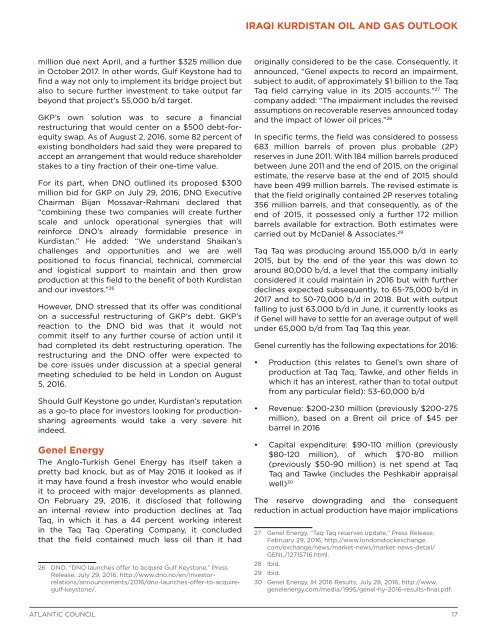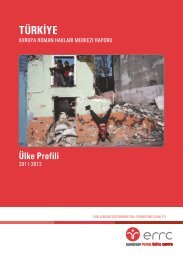You also want an ePaper? Increase the reach of your titles
YUMPU automatically turns print PDFs into web optimized ePapers that Google loves.
<strong>IRAQI</strong> <strong>KURDISTAN</strong> <strong>OIL</strong> <strong>AND</strong> <strong>GAS</strong> <strong>OUTLOOK</strong><br />
million due next April, and a further $325 million due<br />
in October 2017. In other words, Gulf Keystone had to<br />
find a way not only to implement its bridge project but<br />
also to secure further investment to take output far<br />
beyond that project’s 55,000 b/d target.<br />
GKP’s own solution was to secure a financial<br />
restructuring that would center on a $500 debt-forequity<br />
swap. As of August 2, 2016, some 82 percent of<br />
existing bondholders had said they were prepared to<br />
accept an arrangement that would reduce shareholder<br />
stakes to a tiny fraction of their one-time value.<br />
For its part, when DNO outlined its proposed $300<br />
million bid for GKP on July 29, 2016, DNO Executive<br />
Chairman Bijan Mossavar-Rahmani declared that<br />
“combining these two companies will create further<br />
scale and unlock operational synergies that will<br />
reinforce DNO’s already formidable presence in<br />
Kurdistan.” He added: “We understand Shaikan’s<br />
challenges and opportunities and we are well<br />
positioned to focus financial, technical, commercial<br />
and logistical support to maintain and then grow<br />
production at this field to the benefit of both Kurdistan<br />
and our investors.” 26<br />
However, DNO stressed that its offer was conditional<br />
on a successful restructuring of GKP’s debt. GKP’s<br />
reaction to the DNO bid was that it would not<br />
commit itself to any further course of action until it<br />
had completed its debt restructuring operation. The<br />
restructuring and the DNO offer were expected to<br />
be core issues under discussion at a special general<br />
meeting scheduled to be held in London on August<br />
5, 2016.<br />
Should Gulf Keystone go under, Kurdistan’s reputation<br />
as a go-to place for investors looking for productionsharing<br />
agreements would take a very severe hit<br />
indeed.<br />
Genel Energy<br />
The Anglo-Turkish Genel Energy has itself taken a<br />
pretty bad knock, but as of May 2016 it looked as if<br />
it may have found a fresh investor who would enable<br />
it to proceed with major developments as planned.<br />
On February 29, 2016, it disclosed that following<br />
an internal review into production declines at Taq<br />
Taq, in which it has a 44 percent working interest<br />
in the Taq Taq Operating Company, it concluded<br />
that the field contained much less oil than it had<br />
26 DNO, “DNO launches offer to acquire Gulf Keystone,” Press<br />
Release, July 29, 2016, http://www.dno.no/en/investorrelations/announcements/2016/dno-launches-offer-to-acquiregulf-keystone/.<br />
originally considered to be the case. Consequently, it<br />
announced, “Genel expects to record an impairment,<br />
subject to audit, of approximately $1 billion to the Taq<br />
Taq field carrying value in its 2015 accounts.” 27 The<br />
company added: “The impairment includes the revised<br />
assumptions on recoverable reserves announced today<br />
and the impact of lower oil prices.” 28<br />
In specific terms, the field was considered to possess<br />
683 million barrels of proven plus probable (2P)<br />
reserves in June 2011. With 184 million barrels produced<br />
between June 2011 and the end of 2015, on the original<br />
estimate, the reserve base at the end of 2015 should<br />
have been 499 million barrels. The revised estimate is<br />
that the field originally contained 2P reserves totaling<br />
356 million barrels, and that consequently, as of the<br />
end of 2015, it possessed only a further 172 million<br />
barrels available for extraction. Both estimates were<br />
carried out by McDaniel & Associates. 29<br />
Taq Taq was producing around 155,000 b/d in early<br />
2015, but by the end of the year this was down to<br />
around 80,000 b/d, a level that the company initially<br />
considered it could maintain in 2016 but with further<br />
declines expected subsequently, to 65-75,000 b/d in<br />
2017 and to 50-70,000 b/d in 2018. But with output<br />
falling to just 63,000 b/d in June, it currently looks as<br />
if Genel will have to settle for an average output of well<br />
under 65,000 b/d from Taq Taq this year.<br />
Genel currently has the following expectations for 2016:<br />
• Production (this relates to Genel’s own share of<br />
production at Taq Taq, Tawke, and other fields in<br />
which it has an interest, rather than to total output<br />
from any particular field): 53-60,000 b/d<br />
• Revenue: $200-230 million (previously $200-275<br />
million), based on a Brent oil price of $45 per<br />
barrel in 2016 <br />
• Capital expenditure: $90-110 million (previously<br />
$80-120 million), of which $70-80 million<br />
(previously $50-90 million) is net spend at Taq<br />
Taq and Tawke (includes the Peshkabir appraisal<br />
well) 30 <br />
The reserve downgrading and the consequent<br />
reduction in actual production have major implications<br />
27 Genel Energy, “Taq Taq reserves update,” Press Release,<br />
February 29, 2016, http://www.londonstockexchange.<br />
com/exchange/news/market-news/market-news-detail/<br />
GENL/12715716.html.<br />
28 Ibid.<br />
29 Ibid.<br />
30 Genel Energy, IH 2016 Results, July 28, 2016, http://www.<br />
genelenergy.com/media/1995/genel-hy-2016-results-final.pdf.<br />
ATLANTIC COUNCIL<br />
17



